Current Topics
G20 Resource Efficiency Dialogue 2019 and Follow-up of G20 Implementation Framework for Actions on Marine Plastic Litter
From the 8th to the 11th of October 2019, the Ministry of the Environment and the Ministry of Economy, Trade and Industry, together with the United Nations University Institute for the Advanced Study of Sustainability (UNUIAS), organised the G20 Resource Efficiency Dialogue 2019 and Follow-up of G20 Implementation Framework for Actions on Marine Plastic Litter and related events.
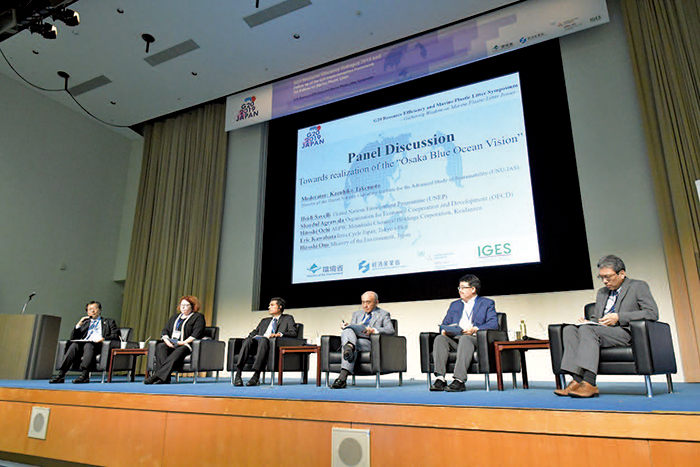

Remarks by Minister of the Environment Koizumi at the "G20 Resource Efficiency Dialogue 2019 and Follow-up of G20 Implementation Framework for Actions on Marine Plastic Litter"
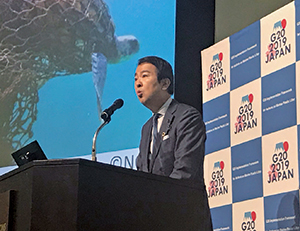 Opening remarks by State Minister of the Environment Ishihara at the "G20 Resource Efficiency and Marine Plastic Litter Symposium"
Opening remarks by State Minister of the Environment Ishihara at the "G20 Resource Efficiency and Marine Plastic Litter Symposium"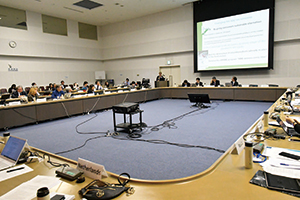 "G20 Resource Efficiency Dialogue 2019 and Follow-up of G20 Implementation Framework for Actions on Marine Plastic Litter"
"G20 Resource Efficiency Dialogue 2019 and Follow-up of G20 Implementation Framework for Actions on Marine Plastic Litter"
Overview of the meeting
The “G20 Resource Efficiency and Marine Plastic Litter Symposium”, that preceded the main meeting garnered roughly 300 participants including the general public. In addition to sharing the outcomes of the G20 Osaka Summit, a panel discussion took place on the topic of the “Osaka Blue Ocean Vision”, where issues related to making the vision a reality and future initiatives were discussed. For the main meeting, the “G20 Resource Efficiency Dialogue 2019 and Follow-up of G20 Implementation Framework for Actions on Marine Plastic Litter”, representatives from 17 countries, both G20 nations and non-G20 outreach nations, were joined by representatives of international organisations and research institutes, to make up the roughly 100 persons in attendance. Pursuant to the “G20 Implementation Framework for Actions on Marine Plastic Litter” agreed upon at the G20 held in Japan in June, the meeting was the first occasion for countries to report on measures and share best practices, as well as to hold discussions on measures and best practices in resource efficiency.
On the second day, the “Africa Solid Waste Management Data Book 2019”, prepared by JICA, was released, and the need for ongoing collection and updating of basic data was confirmed. Moreover, discussions took place on the need for fund mobilisation and raising the priority of waste management in African countries in order to achieve improvements in the field. At the High Level Session, representatives from African nations, participating cities and international organisations gave their high level statements. Minister of the Environment of Japan, Yoshiaki Harada, highlighted the following three areas in particular for strengthening measures to contribute to improved waste management in Africa.
Meeting outcomes
Outcomes of the meeting include recognition of the advantages of sharing information and updating measures and best practices when strengthening initiatives at the national level, as well as a call for non-G20 countries to actively participate in the “Osaka Blue Ocean Vision” and the “ G20 Implementation Framework for Actions on Marine Plastic Litter”. Moreover, it was confirmed that non-G20 countries are able to share information and participate at any time by applying to the G20 Presidency nation in writing. Based on the “G20 Implementation Framework for Actions on Marine Plastic Litter” adopted at the “G20 Ministerial Meeting on Energy Transitions and Global Environment for Sustainable Growth” held in June of this year, information sharing for mutual learning by G20 and outreach countries was conducted for the first time concerning measures to address marine plastic litter. The “G20 Report on Actions against Marine Plastic Litter” was compiled based on information reported by participating countries. Concerning resource efficiency, the “Roadmap for the G20 Resource Efficiency Dialogue” was formulated to include details on the concrete activities of countries in order to facilitate more effective initiatives in other countries, based on agreement at the G20 Osaka Summit.
The UN Climate Action Summit and Related Events
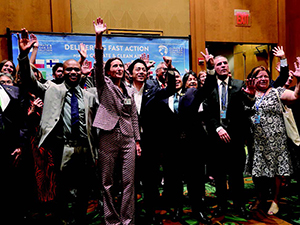 Climate and Clean Air Coalition
meeting
Climate and Clean Air Coalition
meeting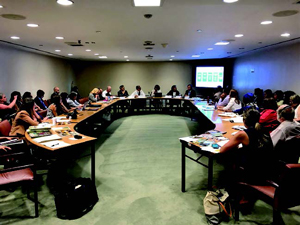 Side event on SATOYAMA
Side event on SATOYAMA
The UN Climate Action Summit
From 22 to 25 September 2019, Minister of the Environment, KOIZUMI Shinjiro, made an official trip to New York to attend the opening ceremony of the UN Climate Action Summit. He also participated in multiple side events including meetings of the Coalition for Urban Transitions and the Climate and Clean Air Coalition (CCAC).
At the summit, 65 countries expressed their intention to achieve carbon neutrality by 2050. In his concluding remarks at the summit, UN Secretary General António Guterres stressed the need for more countries and businesses to have concrete ambitions and for initiatives in carbon pricing to green our economies. Prior to the summit, on 20 September, Minister Koizumi expressed Japan’s intent to participate in the “Carbon Neutrality Coalition”, a group of pioneering nations working to achieve decarbonisation.
Moreover, at the “SDG Summit 2019” on 24 September, Prime Minister Abe highlighted achievements reached in promotion of the SDGs over the past four years, including the outcomes of the G20 Osaka Summit and TICAD7. In related efforts, the Ministry of the Environment held the following two side events in July at the UN High-Level Political Forum 2019, a meeting aimed at follow-up and review of the SDGs.
Side event, ‘’Satoyama Initiative- Society in Harmony with Nature: An Inclusive Approach for Communities on Landscapes and Seascapes’’
This side event was jointly organised by the Ministry of the Environment, Cabinet Office and Ministry of Foreign Affairs of Japan, the United Nations University Institute for the Advanced Study of Sustainability (UNU-IAS), and the Institute for Global Environmental Strategies (IGES). The outcomes of the G20 ministerial meeting in Karuizawa and the concept of the “circulating and ecological economy”, which is aimed at achieving the SDGs and decarbonisation, were introduced at the beginning of the session. In the panel discussion, presentations were made on localisation of the SDGs towards realising sustainable cities.
Side event, “SATOYAMA – Society Living in Harmony with Nature: An inclusive approach from Communities, Landscapes and Seascapes”
This side event was jointly organised by the Ministry of the Environment of Japan, the Government of Bhutan, the Government of Costa Rica, the Global Environment Facility Small Grants Programme, IGES, the Secretariat of the Convention on the United Nations Development Programme and the UNU-IAS.
Vice-Minister for Global Environmental Affairs, MORISHITA Satoru, speaking from the standpoint of a major donor, remarked on the Satoyama Initiative’s outcomes to date and its contribution to the post- 2020 global biodiversity framework. IGES President, TAKEUCHI Kazuhiko, gave the keynote address on the role the Satoyama Initiative plays in the SDGs and the post- 2020 global biodiversity framework. Concrete lessons learned from case studies were shared in the panel discussion.

The International Partnership for the Satoyama Initiative
https://satoyama-initiative.org/ Outcomes of the Twelfth Intergovernmental Regional Environmentally Sustainable Transport (EST) Forum in Asia
The role of the EST Forum going forward
In October 2019, the Ministry of the Environment held the Twelfth Intergovernmental Regional Environmentally Sustainable Transport (EST) Forum in Asia in cooperation with the United Nations Centre for Regional Development. Important discussions took place on promoting EST (Environmentally Sustainable Transport) in the Asian region.
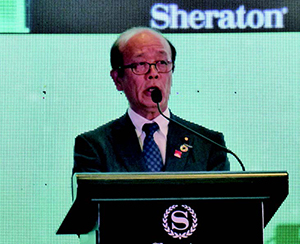
Presentation by Parliamentary Vice- Minister of the Environment Yagi
Overview of the forum’s activities to date
The rapid advancement of motorisation has gone hand in hand with economic development and urbanisation in the Asian region, leading to a striking escalation in environmental impacts. In order to come together to address environmental problems such as air pollution, as well as societal issues including lack of access to transportation and disparity across regions, Japan and the UNCRD proposed the “Intergovernmental Regional Environmentally Sustainable Transport (EST) Forum in Asia” in 2005 to promote the concept of EST. Since then, forums have been held nearly every year in various locations in Asia.
Overview and outcomes of 12th Forum
The Twelfth Intergovernmental Regional Environmentally Sustainable Transport (EST) Forum in Asia was held in Hanoi, Vietnam, from 28 to 31 October 2019. Among the approximate 300 participants from 22 Asian nations were high-level government officials working in the areas of environment and transportation, mayors and representatives of international organisations. Discussions revolved around the main theme, “Achieving Smart and Resilient Cities Through Low Carbon and Intelligent Transport System”. Fifteen Japanese cities and companies gave presentations and numerous best practices in environmentally sustainable transport both in Japan and overseas were introduced.
Representing the Japanese government, Parliamentary Vice- Minister of the Environment, YAGI Tetsuya, stressed the role of the EST Forum going forward in strengthening cooperation between the public and private sectors towards decarbonization and integrated initiatives hinged on the SDGs and the Paris Agreement. Furthermore, Japan proposed the introduction of an evaluation process aimed at developing policies in participating countries based on the discussion at the forum. Additionally, 12 Japanese groups and companies displayed posters showcasing their initiatives and technologies, revealing preeminent technologies that could contribute to the actualisation of EST in many countries.
Looking ahead to 2030
Japan will continue to exhibit strong leadership in addressing current global challenges such as achieving the SDGs and the targets of the Paris Agreement. We will strive to contribute to the establishment of environmentally-sound sustainable transport systems in countries around the world via the EST Forum.


